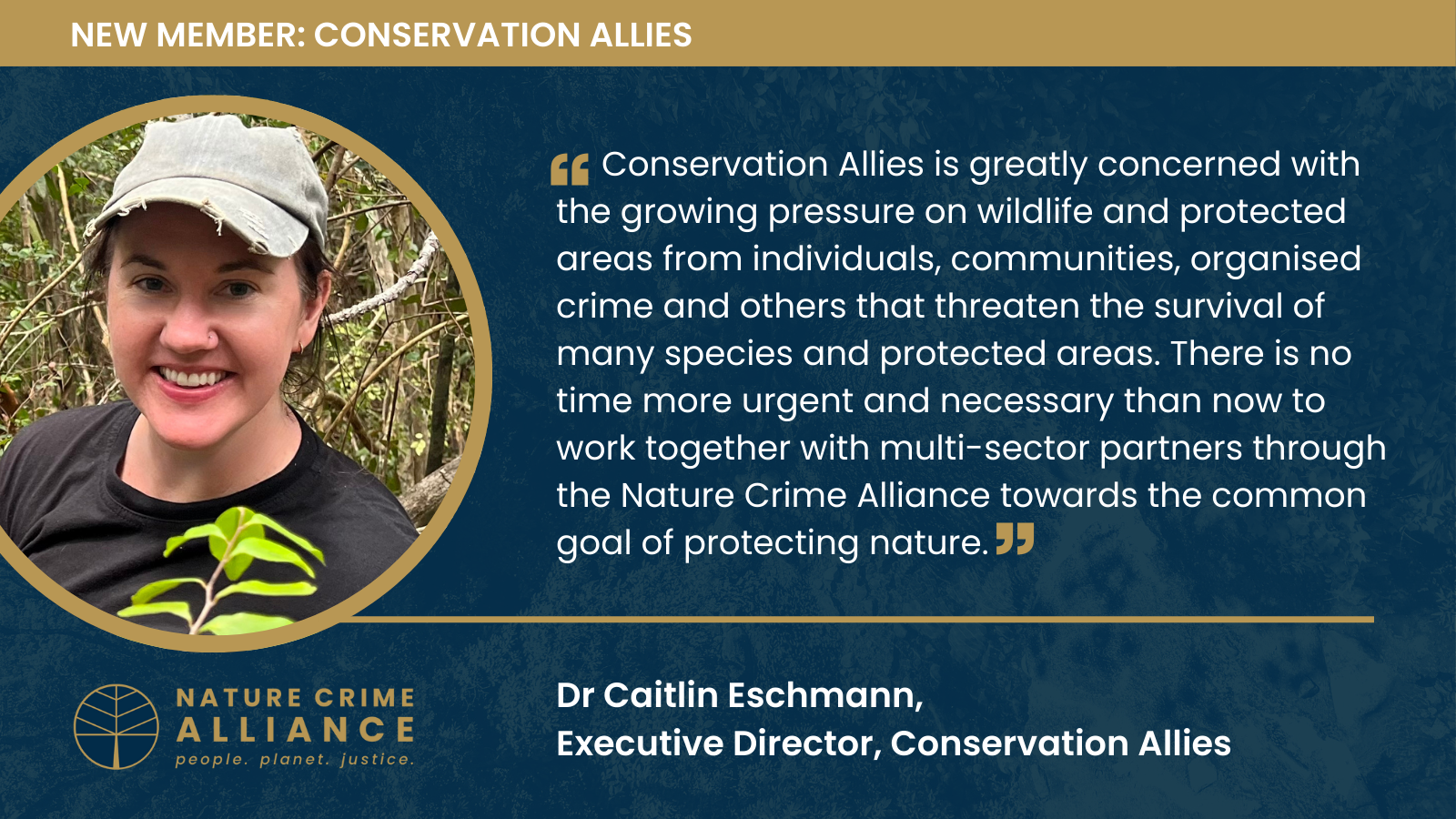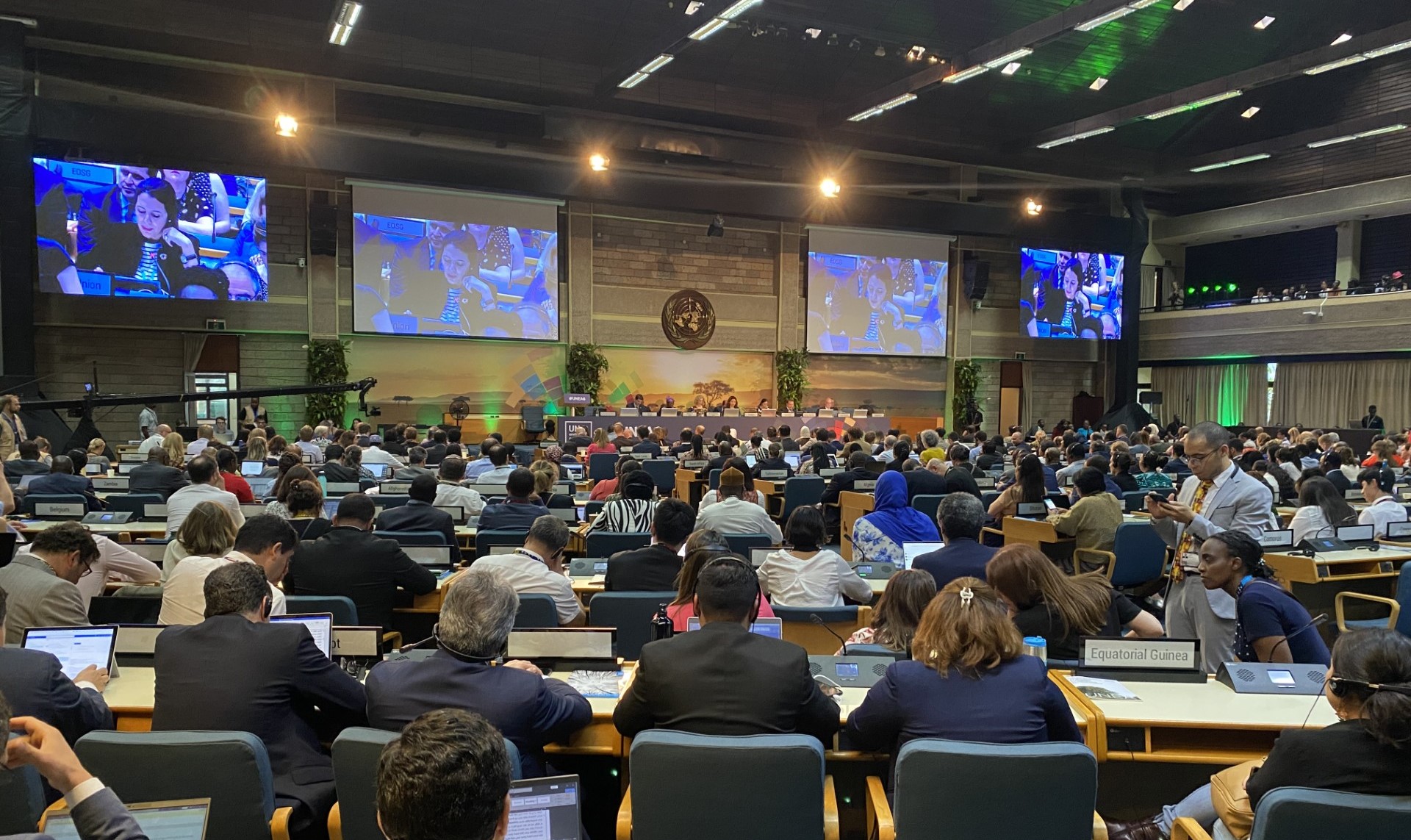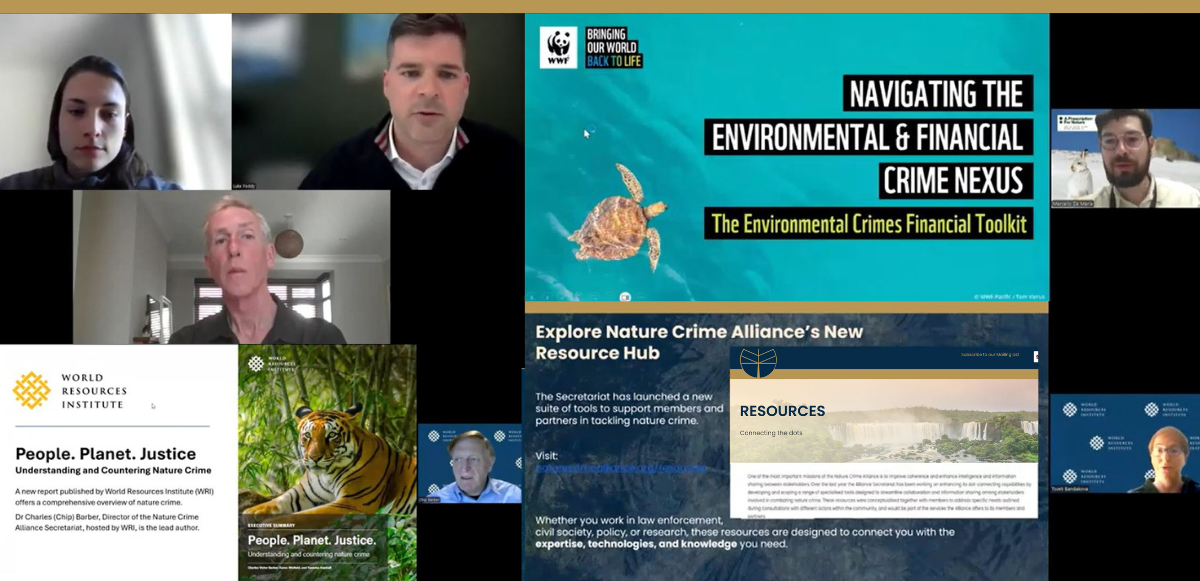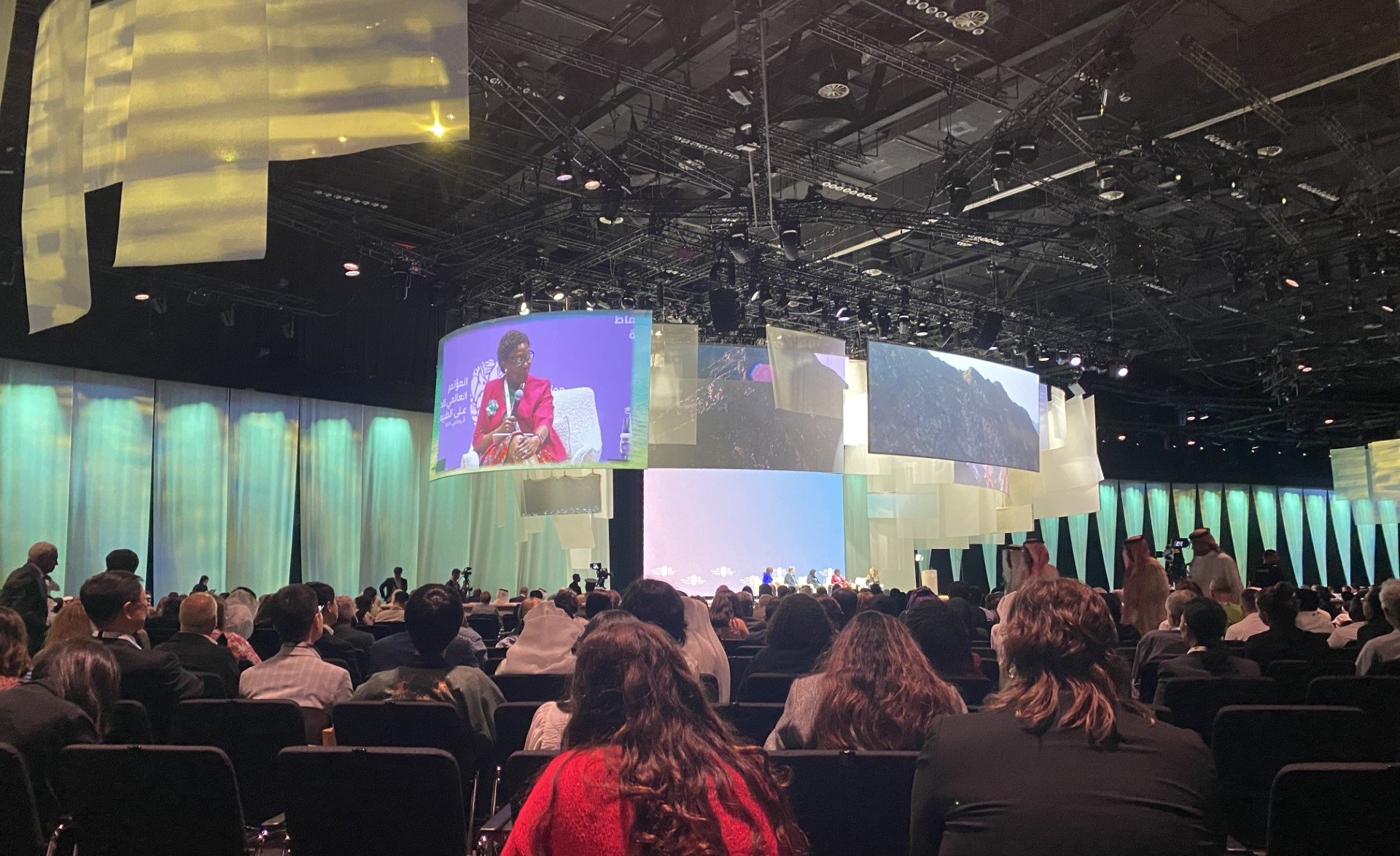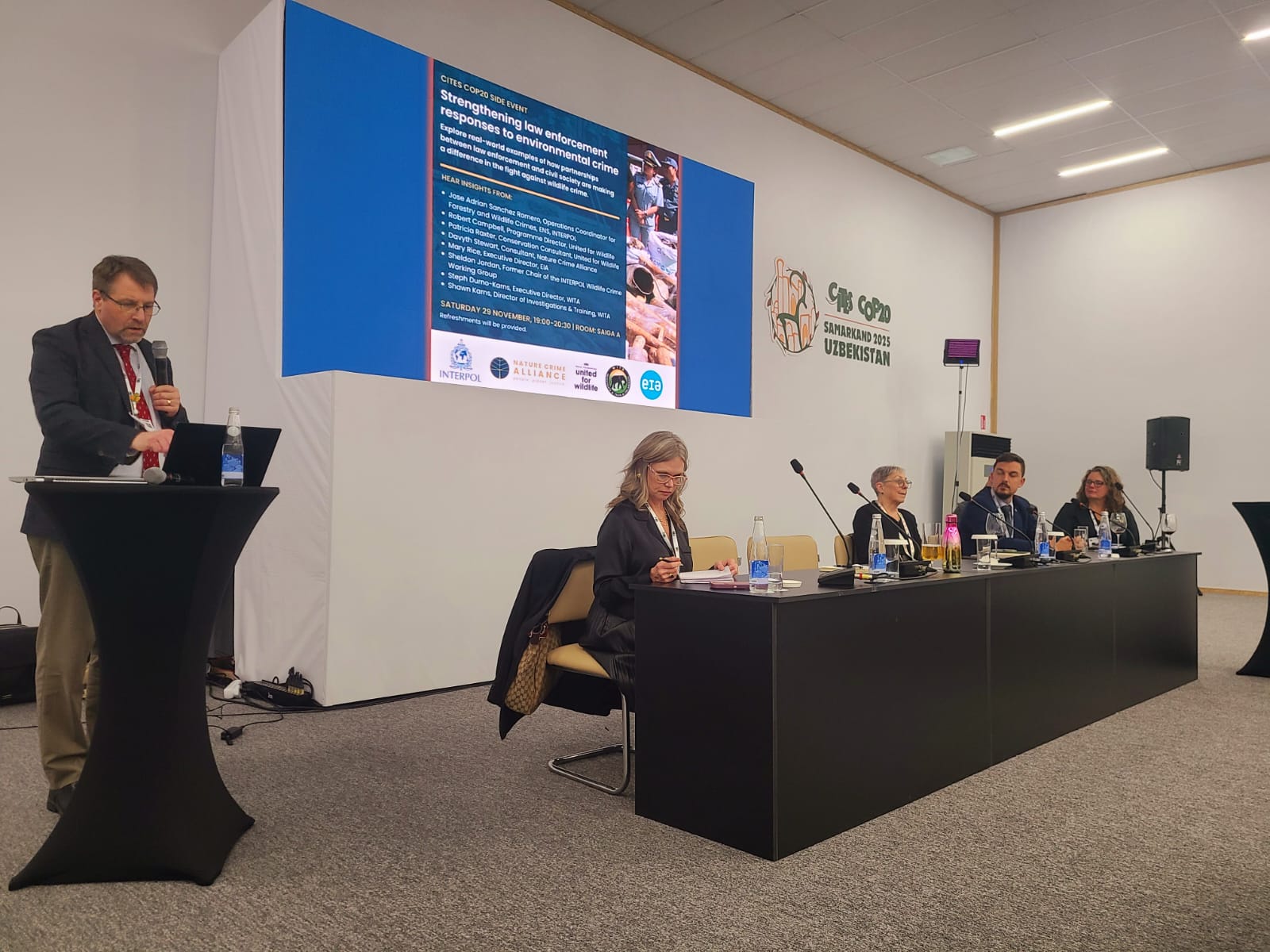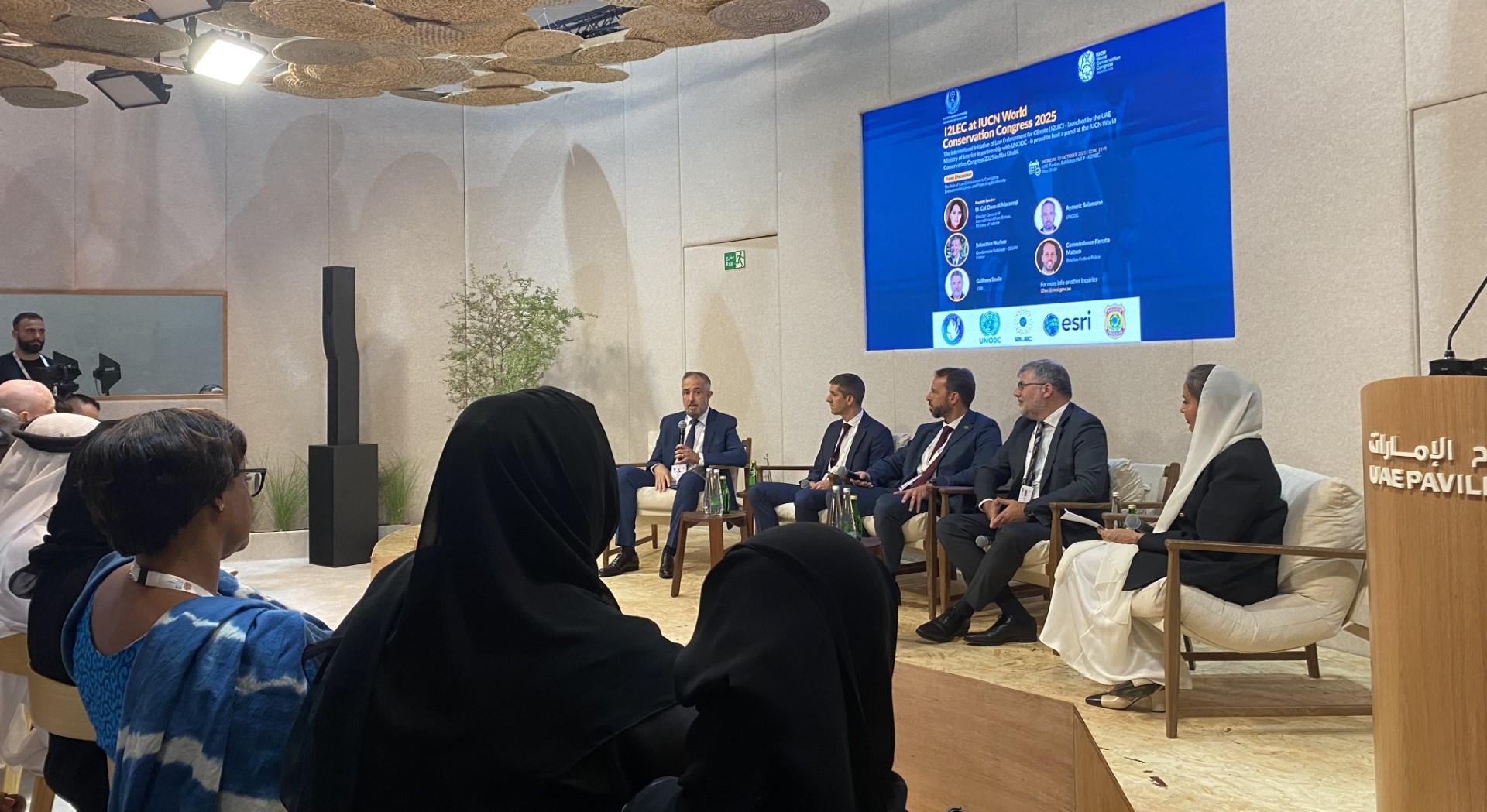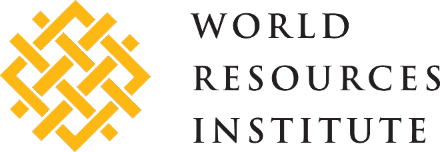Author: Luke Foddy
Conservation Allies joins the Nature Crime Alliance
The Nature Crime Alliance has welcomed Conservation Allies as its latest member.
Conservation Allies is a unique not-for-profit that helps organisations access the financial resources they need to make a major impact on biodiversity conservation.
Based in Washington DC, the organisation works globally, mobilising financial resources to support on-the-ground nature protection against illegal activities across Africa, Asia and Latin America.
Alongside financing the IUCN International Ranger Award – which recognises rangers from across the planet who put their lives at risk in the protection of nature – Conservation Allies supports a wide range of local and national NGOs to confront environmental crime.
This ranges from strengthening operational capacity of organisations tackling nature crime in Colombia and Ecuador, to financing environmental lawyers in Madagascar to ensure perpetrators are pursued and prosecuted.
Dr Caitlin Eschmann, Executive Director of Conservation Allies, commented: “Conservation Allies is greatly concerned with the growing pressure on wildlife and protected areas from individuals, communities, organised crime and others that threaten the survival of many species and protected areas. There is no time more urgent and necessary than now to work together with multi-sector partners through the Nature Crime Alliance towards the common goal of protecting nature.
“Conservation Allies and our dozens of local conservation partners looks forward to collaborating in the Alliance.”
Launched in August 2023, the Nature Crime Alliance is a multi-sector network that brings organisations together to find ways to bolster operational capacity and mobilise financial commitments to where they are needed most.
Dr Charles ‘Chip’ Barber, Director of the Nature Crime Alliance, which is hosted by World Resources Institute, said: “Conservation Allies does crucial work in supporting those on the frontline against environmental crime. We look forward to helping them deepen their work in this space and find new partnership opportunities among the Alliance network.”
Building momentum on environmental crime: Why 2026 matters

Elodie Perrat, Senior Manager, Nature Crime Alliance Secretariat, shares her thoughts on the key moments that could drive international progress on environmental crime this year.
Environmental crime—such as illegal mining, logging, fishing, and wildlife trafficking—continues to devastate ecosystems, undermine livelihoods, and fuel corruption and human rights abuses. Increasingly, governments recognise that global biodiversity and climate goals cannot be met without addressing these crimes more effectively. Yet international responses remain fragmented, spread across environmental, criminal justice, and financial governance systems that often operate in silos.
Against this backdrop, 2026 presents a series of policy moments that could help shift the international response to environmental crime from piecemeal action toward a more coherent and coordinated architecture. Building on important breakthroughs in 2025, these moments span criminal justice, illicit finance, environmental governance, and multilateral diplomacy. Whether they translate into durable change will depend on governments’ ability to align action across these domains and move decisively from political commitments to implementation.
Strengthening the criminal justice response
At the heart of this momentum is the international criminal justice system. The 15th UN Crime Congress, convening in Abu Dhabi from 15–30 April, offers a major opportunity to consolidate global attention on crimes that affect the environment. The Congress follows the IUCN World Conservation Congress, also hosted in Abu Dhabi in October 2025, which adopted a resolution on crimes that affect the environment—firmly anchoring the issue within the global conservation agenda.
The proximity of these two major gatherings is significant. At the IUCN Congress, discussions repeatedly underscored the need to carry conservation momentum into criminal justice processes. This was reflected in a session convened by the UAE Interior Ministry on the role of law enforcement in addressing environmental crime, with contributions from the Ministry’s Foreign Affairs Bureau, Brazil’s Federal Police, France’s Gendarmerie Nationale, UNODC, and ESRI. These discussions highlighted growing recognition that environmental crime must be treated not only as an environmental issue, but as a serious, organised, and often transnational criminal threat.
The Crime Congress’s outcome document, the Abu Dhabi Declaration, is currently under negotiation and is expected to help set global priorities on crimes that affect the environment. If adopted with strong and specific language, it could consolidate international consensus and strengthen the mandate of UNODC and national criminal justice authorities to address these crimes more systematically.
Momentum may also build around a potential new protocol to the UN Convention against Transnational Organized Crime (UNTOC). Championed by the Global Initiative to End Wildlife Crime, a founding member of the Nature Crime Alliance, such a protocol would elevate environmental crimes within the UNTOC framework, alongside human trafficking, migrant smuggling, and firearms trafficking. The 2nd Meeting of the UNTOC Intergovernmental Expert Group on Environmental Crimes, convening in Vienna from 24–26 February, will be a key moment in shaping recommendations ahead of UNTOC COP13 later in the year.
Following the money
While criminal justice frameworks are essential, they are insufficient on their own. Environmental crime is driven by profit, and tackling its financial underpinnings is critical. In June, the UK Government will host an international summit on illicit finance, with illegal gold expected to feature prominently. Rising gold prices have intensified illegal, environmentally destructive mining, increasing pressure on governments to act.
The UK summit aims to build an international coalition to address illicit financial flows linked to illegal gold, including through stronger law enforcement cooperation. It follows a setback at the 7th UN Environment Assembly (UNEA-7), where proposals for a binding international minerals treaty were scaled back to a non-binding resolution—illustrating the political sensitivities surrounding extractive industries.
As attention turns to implementation, parallel discussions within financial integrity frameworks will be crucial. In particular, debates within FATF-related processes will shape whether crimes against the environment are treated consistently as predicate offences for money laundering. Progress in this area remains uneven, yet without it, efforts to disrupt the financial incentives driving environmental crime will remain limited.
Corruption, a key enabler of environmental crime, has received increased attention as well. At the 11th Conference of the States Parties to the UN Convention against Corruption (UNCAC), convened in Doha, Qatar, in December 2025, Member States adopted a new resolution on preventing and combating corruption related to crimes that affect the environment. Tabled by Brazil and Namibia, the resolution represents an important step forward. However, it stops short of fully integrating environmental crimes into anti-money laundering frameworks—highlighting an ongoing gap between political recognition and operational impact.
Environmental governance and regional leadership
Environmental crime is also increasingly recognised within environmental governance processes. As countries move into implementation of the Kunming–Montreal Global Biodiversity Framework, addressing the illegal exploitation of natural resources will be essential to achieving biodiversity targets. This reinforces the need for stronger alignment between biodiversity policy and criminal justice responses.
In Europe, a landmark development occurred in December 2025, when the European Union signed the Council of Europe Convention on the Protection of the Environment through Criminal Law. As the first international legally binding instrument dedicated specifically to environmental crime, the Convention goes beyond the EU Directive’s minimum standards by establishing common definitions and criminalisation requirements. It obliges Parties to ensure that serious environmental offences are punishable by effective, proportionate, and dissuasive sanctions, creating a framework with potential relevance well beyond Europe.
UNEA-7 and its follow-up processes will remain important spaces to watch in 2026, particularly for issues such as illegal mining, mercury use, and environmentally harmful supply chains. While recent negotiations have exposed political sensitivities, UNEA remains a critical forum for bridging environmental and criminal justice agendas.
Political coalitions and multilateral momentum
Beyond formal treaties and resolutions, political momentum is also building through coalitions and declarations. At the G20 Leaders’ Summit in Johannesburg in November 2025, the Leaders’ Declaration referenced several issues closely linked to environmental crime, including illegal, unreported and unregulated fishing, corruption, whistleblower protections, and implementation of UNCAC. It also cited the Cape Town Ministerial Declaration on Crimes that Affect the Environment, recognising the urgent need to strengthen national responses.
Further momentum emerged in Rio de Janeiro at the United for Wildlife Environmental Crime Summit and the International Wildlife Crime Conference. Two outcomes were particularly significant: the launch of the Coalition for Multilateral Action against Crimes that Affect the Environment, led by Brazil, and the signing of the Rio Declaration on Crimes that Affect the Environment by a growing number of countries, supported by civil society stakeholders.
With Brazil playing a prominent convening role across environmental and climate fora, climate-related processes—including COP follow-up—may increasingly serve as platforms to highlight the climate impacts of environmental crime, particularly illegal deforestation and mining.
Members interested in collaborating on side events or related initiatives at upcoming international fora are encouraged to get in touch with Elodie Perrat, Senior Manager, Nature Crime Alliance, at elodie.perrat@wri.org
Highlights from the Nature Crime Alliance in 2025
MESSAGE FROM THE DIRECTOR
This 2025 roundup captures the highlights from the Nature Crime Alliance in what has been a challenging yet productive year. As with many of our members and partners around the world, we have been affected by the shifts taking place across the global funding landscape. Despite these challenges, we have managed to continue some core elements of our work to raise political will and drive much-needed cross-sector collaboration on environmental crime. The need for this multi-sector approach has not gone away, and we will endeavour to build on our successes next year.
Thank you to all our members in the Nature Crime Alliance for all you do, and to those partners who have supported our work. I wish you all a happy and peaceful end to the year and look forward to renewed collaboration in 2026.
Dr Charles ‘Chip’ Barber
Director, Nature Crime Alliance
RAISING POLITICAL WILL
The Alliance Secretariat has worked with members throughout 2025 to coordinate and support a range of initiatives at the international level to raise the political will we need to drive progress.
IUCN adopts new resolution on crimes that affect the environment
A new Resolution on Crimes that Affect the Environment (CAE) was adopted at the IUCN World Conservation Congress in Abu Dhabi in October.
The resolution gives IUCN a mandate to address environmental crime in its workplan, and calls on the global conservation community to work together to tackle illicit activities such as illegal logging, mining, fishing, wildlife trafficking, and other forms of environmental crime. It represents a landmark moment in getting environmental crime on the conservation agenda.
The Alliance team worked closely with our members including the Wildlife Conservation Society (WCS) and the National Whistleblower Center (NWC) to draft a motion on this issue, which was later merged with another motion on CAE developed separately by France and ICEL.
Commenting on the efforts of the Alliance and its members to support this shared outcome, Scott Hajost, Senior Environmental Policy Adviser, National Whistleblower Center, said:
“The Nature Crime Alliance has really been the glue that has bound us together in this process, providing a crucial focal point to coordinate members and other stakeholders, including governments, in developing the resolution. This outcome reflects the essential role of cross sector collaboration in the fight against crimes that affect the environment.”
Read more about the resolution
The Alliance also organised a thematic session at the Congress exploring how we can implement the resolution across IUCN’s network. Read more
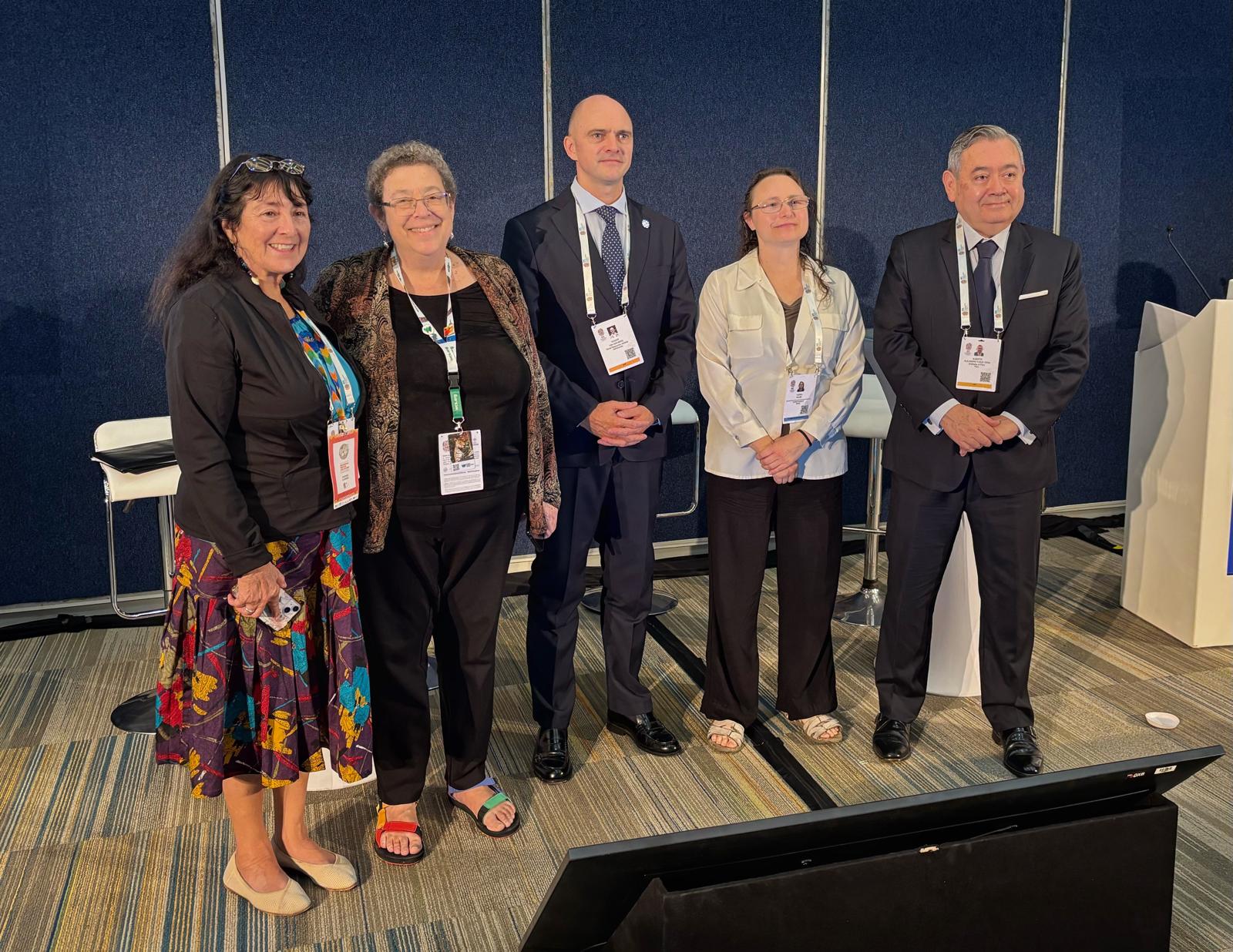
UNCAC resolution recognises role of corruption in driving environmental crime
The good news at the IUCN Congress was followed by another success at the UN Convention Against Corruption (UNCAC) 11th Conference of the States Parties in Doha, which saw the adoption of a new resolution on preventing and combating corruption as it relates to crimes that affect the environment. Alongside the efforts of States that supported the motion, which was tabled by Brazil and Namibia, this outcome reflects the hard work of members of the UNCAC Coalition and its Environmental Crime and Corruption Working Group (ECCWG) chaired by the Wildlife Justice Commission. The Alliance Secretariat is proud to be a member of the ECCWG and to have supported efforts in Doha. Congratulations to the States and civil society stakeholders who delivered this big win for biodiversity.
The successes at IUCN and UNCAC are just two of several developments at the international level in 2025 relating to environmental crime. We have pulled together some policy highlights here.
Keeping nature crime on the international agenda
The Alliance Secretariat has continued to engage with policymakers throughout 2025. Earlier this month, Elodie Perrat, Senior Manager, briefed policymakers in New York on the state of play on environmental crime across international processes, highlighting the need to bring the various discussions across different fora together into coordinated action.
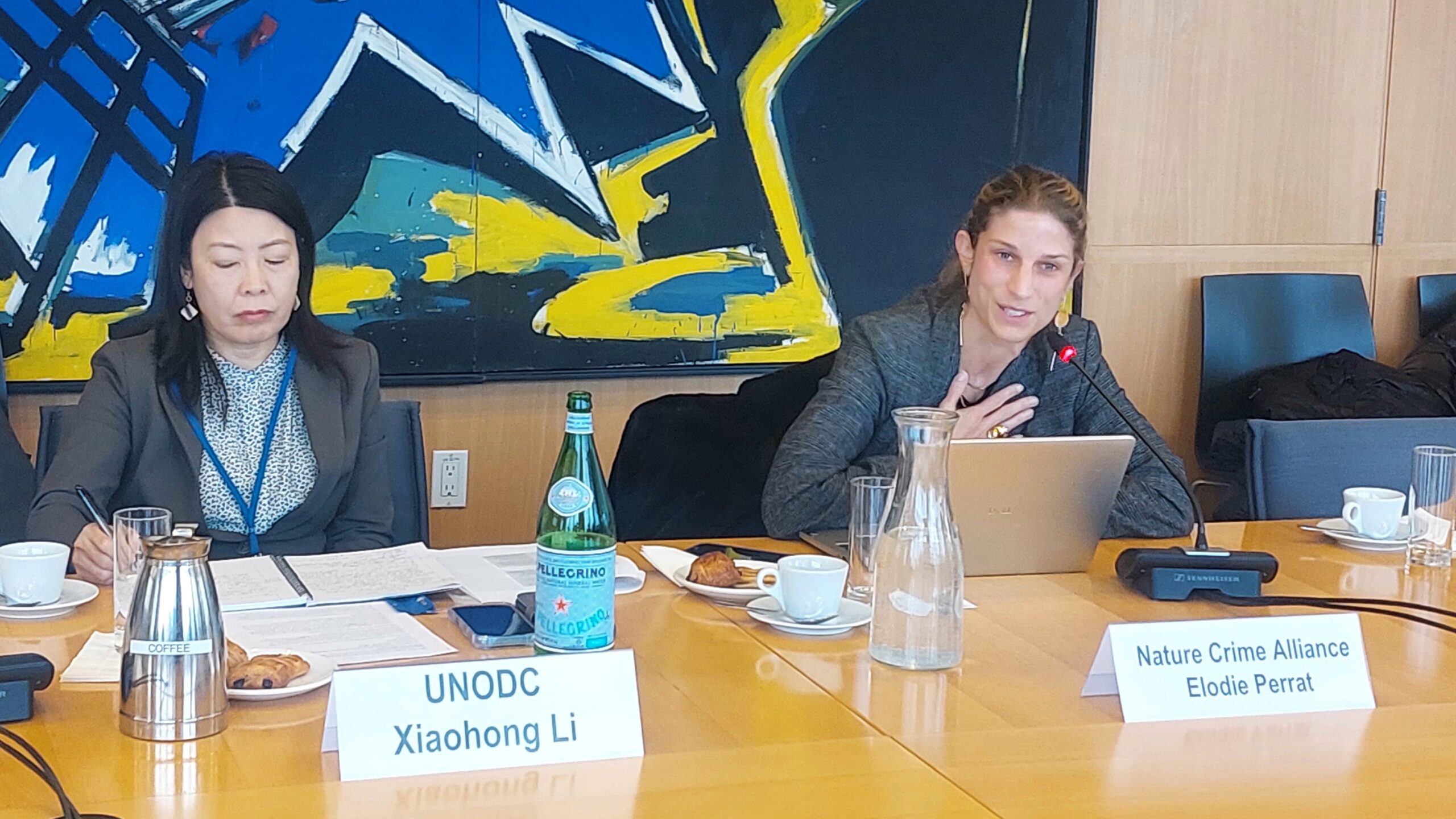
The Alliance team also sought to keep financial crime linked to environmental crime on the policy agenda, with Lynn Schlingemann, Senior Financial Crime and Corruption Associate, participating at a conference hosted by the Financial Intelligence Unit of Latvia, and the EU Commission’s ‘Environmental Crime: Five years for the EU to turn the tide!’ summit in March. Lynn also spoke at the UK Government’s Gold Conference in London this October.
In March, Ruth Nogeuron, Senior Associate, World Resources Institute, shared insights on wildlife crime in Latin America with governments and civil society actors during a meeting convened by the Group of Friends on Combatting Illicit Wildlife Trafficking, chaired by Germany, in New York.
Wildlife crime was also central to a side event the Alliance co-organised at the 20th Conference of the Parties to the Convention on International Trade in Endangered Species of Wild Fauna and Flora (CITES COP20), which focused on ways to improve collaboration between law enforcement and civil society actors.
BOLSTERING CAPACITY
The Alliance has continued to leverage its multi-sector approach to support a range of stakeholders to bolster their efforts to tackle environmental crime.
Guidelines delivered to strengthen CSO-law enforcement collaboration
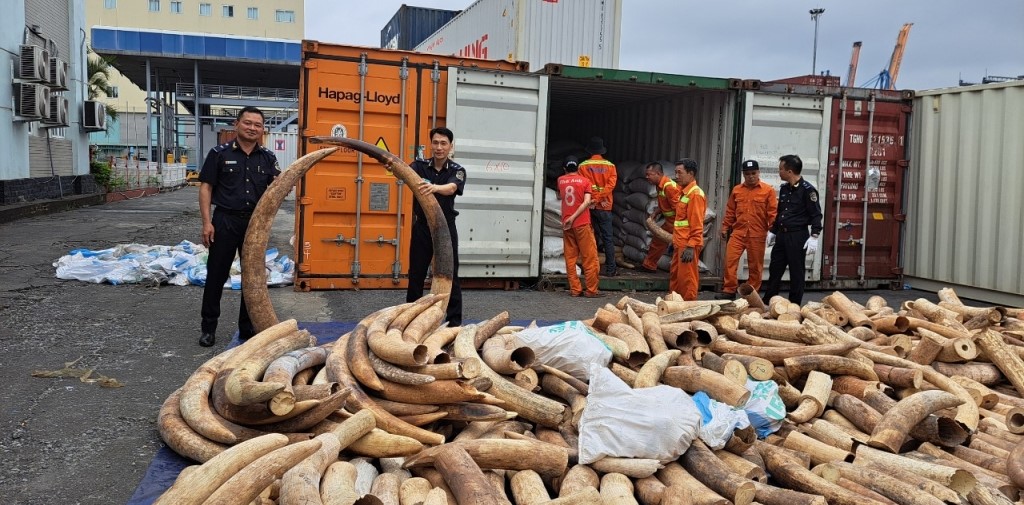
The Nature Crime Alliance, with the support of United for Wildlife and members of the INTERPOL Wildlife Crime Working Group, published a new set of Guidelines to improve the processes for civil society organisations (CSOs) to share information with law enforcement on environmental crime. The Guidelines aim to meet an often-cited and critical challenge: ensuring that high-quality information collected by CSOs is shared effectively with the appropriate law enforcement authorities in a way that is useful for investigations and prosecutions.
The Guidelines [PDF] have been shaped by feedback from both law enforcement and CSO stakeholders, with aspects aimed at both communities.
Nature Crime Resources launched
In April, the Alliance launched a raft of new Resources aimed at meeting the needs of law enforcement and civil society organisations working on crimes such as wildlife trafficking, land grabbing, and illegal forms of mining, logging, and fishing.
Developed through consultations and support from members of the Alliance, the resources include:
Wildlife Expert Directory: This resource, part of which is designed specifically for law enforcement professionals, provides access to experts on specific species and ecosystems to support wildlife crime investigations.
Index of Tools: This resource offers a well-organised catalogue of the latest digital technologies, tools and datasets existing in the field. It currently lists and provides links to more than 80 monitoring and tracking tools, indices, dashboards and platforms.
Knowledge Database: The knowledge database brings relevant research, reports and insights together in one place, providing a wealth of information on envrionmental crime at the click of a button.
Improving journalists’ understanding of environmental crimes
More than 100 journalists and communications professionals took part in a training course on environmental crime convened in partnership between the Nature Crime Alliance and its members the UN Interregional and Crime and Justice Research Institute (UNICRI) and the FACT Coalition.
‘Uncovering Environmental Crimes: Specialised Trainings for Journalists and Communications Professionals’ aimed to provide practical insights into tools and approaches drawn from intelligence analysis, financial journalism, and conservation criminology.
Five members of the Alliance – UNICRI, FACT Coalition, WWF-UK, Earth League International, and World Resources Institute (WRI) – delivered training sessions, alongside experts from across journalism, academia and civil society. Read more.
Driving information exchange between members and partners
The Alliance has continued to serve as a forum to share information and insights between members on a range of issues relating to environmental crime.
The Working Group for Indigenous People and Frontline Defenders (WGIPFD), convened in partnership with Indigenous Peoples’ Rights International, brought more than 20 representatives from 11 Indigenous Peoples organisations together in March for a session on forest monitoring technologies. Participants from South America, Africa and Southeast Asia joined the session, which also demonstrated the value of partnerships in protecting territories by providing support between communities.
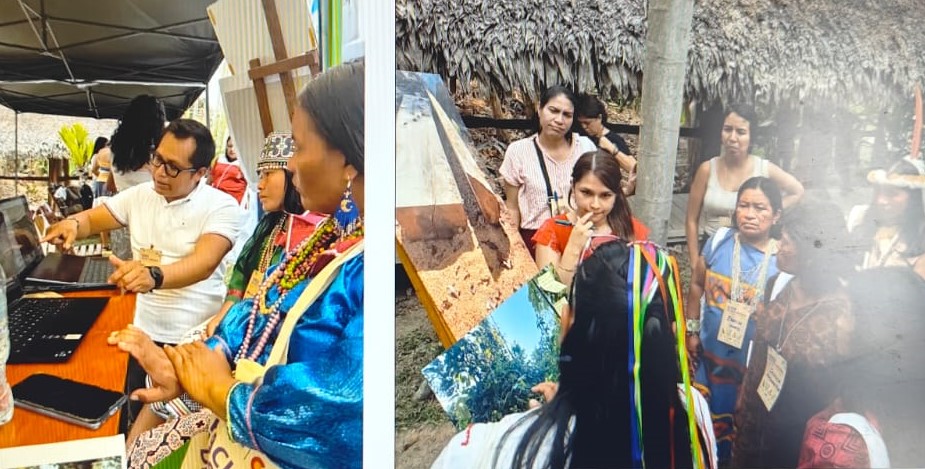
The WGIPFD also held a session in May focusing on Indigenous journalism and communications, with expert insights from Nelly Luna Amancio, Editor and Co-Founder of Ojo Público, and Yanua Atamain, a social communicator and Director of Ciber Amazonas. The session drew together more than 20 representatives from Indigenous communities around the world to explore the role of Indigenous journalism in shaping national responses to nature crime and the advancement of Indigenous rights.
The Alliance team has also continued to support the Private Sector Dialogues (PSD) on the Disruption of Financial Crimes related to Crimes that Affect the Environment, with the first South America PSD taking place in Lima, Peru, in December. The session, which brought together banks, financial intelligence units, and law enforcement authorities, aimed to strengthen collaboration between the public and private sectors and increase participants’ understanding of risk indicators, red flags, modus operandi, and typologies of financial crimes linked to illegal mining and logging. Responding to feedback, 95% of attendees noted that they had gained new information from the sessions. Read more.
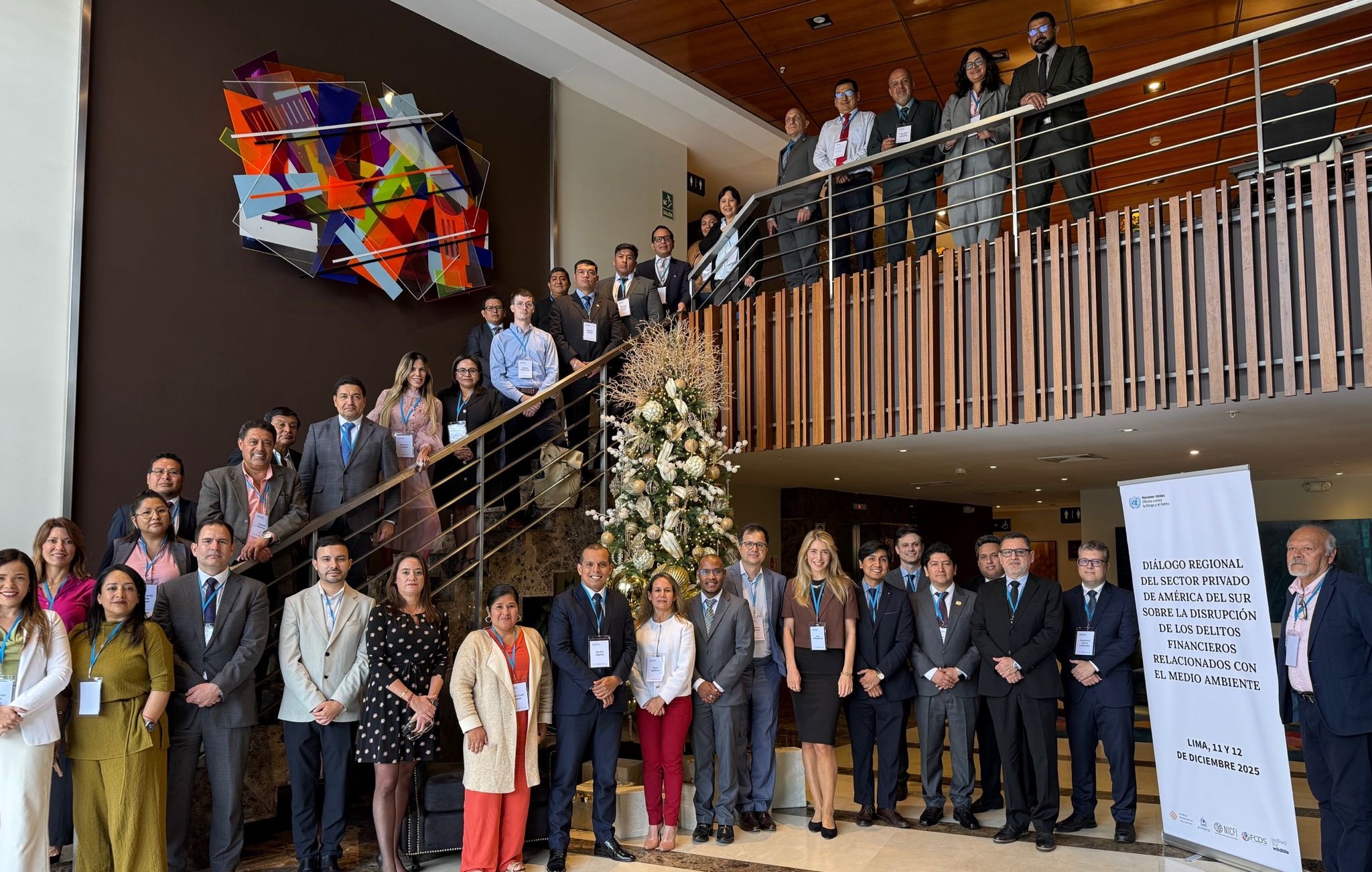
The ‘Meet the Nature Crime Alliance’ webinar series also continued in 2025, providing a platform for members to share information and insights from their work. In May, we explored the challenge of nature crime in Peru, with Dr Frank Robert Almanza Altamirano, National Coordinating Senior Prosecutor at the Specialized Environmental Prosecutor’s Office, discussing the policy approaches that are needed, such as legislation to close legal loopholes used by criminals to plunder nature. Dr Almanza also highlighted how aspects of political power can present a challenge to prosecuting nature crime cases.
Different approaches to tackling wildlife crime in Africa were also explored during the webinar, with Shawn Karns, Founding Director of the Wildlife Investigators Training Alliance (WITA), sharing WITA’s approach – particularly its focus on the “criminal justice value chain.” Shawn also spoke of the value of partnerships and collaboration – including initiatives like the Nature Crime Alliance – and the need to eradicate silos among stakeholders fighting wildlife crime.
In our April webinar, we illuminated the illicit trade in Myanmar teak and a new resource to tackle financial crime linked to environmental crime. Marcello De Maria, Project Manager, WWF-UK, unpacked the Environmental Crimes Financial Toolkit – an online platform that assists financial institutions in monitoring risks related to nature crimes such as illegal deforestation, land conversion, and wildlife trafficking. Marcello’s presentation was followed by Julian Newman, Campaigns Director, and Kate Klikis, Forests Campaigner, at the Environmental Investigation Agency, who highlighted how Myanmar teak – a highly sought-after timber used for furniture and luxury yacht decking – continues to enter the US and EU markets despite measures to prevent this illegal trade.
Contributing to global knowledge
The Nature Crime Alliance Secretariat is hosted by World Resources Institute (WRI) – an independent research organisation that leverages data, expertise and global reach to influence policy and catalyze change. In April, WRI published a major report on nature crime, co-authored by Alliance Director Dr Charles ‘Chip’ Barber, that provides analysis on how these crimes work; their convergences with other forms of serious organised crime including financial crimes and human rights violations; and recommendations to support the global response to this challenge. Read the full report
Chip and Alliance Communications Manager Luke Foddy also published a WRI Insights article that explores five solutions to help tackle environmental crime, while another WRI Insights piece published in July saw Chip share analysis of organised crime networks in the Amazon.
WELCOMING NEW MEMBERS
This year saw us welcome new members to the Alliance, including ASOC, Environmental Justice Foundation, Rights and Resources International, and Conservation Allies. These organisations join a range of governments, law enforcement and international organisations, and civil society stakeholders in the Nature Crime Alliance, which now numbers 47 members.
Thank you to everyone who has engaged with the Nature Crime Alliance in 2025!
Taking stock: Policy-level progress on environmental crime in 2025

Elodie Perrat, Senior Manager, Nature Crime Alliance Secretariat, shares her thoughts on the progress made at the international level to counter environmental crime, and what lies ahead in 2026.
One of the strategic objectives of the Nature Crime Alliance is to increase political will among governments to more effectively prevent and combat environmental crime. This requires sustained engagement across the international fora that shape governments’ policies, priorities, and enforcement frameworks worldwide.
In 2025, momentum continued to build across several multilateral processes—though progress was uneven.
Below are our key policy takeaways from this year.
1) Political will continued to rise
Environmental crime featured more prominently in high-level political discussions in 2025, signaling growing recognition of its seriousness.
At the G20 Leaders’ Summit in Johannesburg, South Africa, on 22–23 November, the Leaders’ Declaration referenced several pertinent issues closely linked to environmental crime, including illegal, unreported and unregulated (IUU) fishing; corruption; implementation of the UN Convention Against Corruption (see below); and whistleblower protections. The Declaration also cited the Cape Town Ministerial Declaration on Crimes that Affect the Environment, which recognises ‘the urgent need to strengthen national responses to address’ these crimes.
Another indication of increasing political will came in Rio de Janeiro, where ministers and civil society representatives gathered for the United for Wildlife Environmental Crime Summit and International Wildlife Crime Conference in November. Two outcomes were particularly significant; The launch of the Coalition for Multilateral Action against Crimes that Affect the Environment, led by Brazil, and the signing of the Rio Declaration on Crimes that Affect the Environment by a range of countries, supported by civil society stakeholders.
Both initiatives aim to catalyse more coordinated, ambitious international action against environmental crime.
2) Environmental crime gained traction on the conservation agenda
A major milestone this year was the adoption of a new resolution on Crimes that Affect the Environment at the IUCN World Conservation Congress in Abu Dhabi, UAE, in October.
The resolution gives IUCN a mandate to address environmental crime across its programme of work, and calls on the global conservation community to collaborate in tackling illicit activities such as illegal logging, mining, fishing, wildlife trafficking, and related offences.
Its adoption represents a landmark moment in firmly embedding environmental crime within the conservation agenda. The challenge now will be translating this mandate into concrete actions, and integrating it into the strategies and programmes of IUCN Members.
Progress was also evident under the Convention on International Trade in Endangered Species of Wild Fauna and Flora (CITES). At the 20th Conference of the Parties (COP20) in Samarkand, Uzbekistan, in December, States Parties adopted stronger enforcement measures and tighter regulations across multiple species groups . Protections were enhanced for sharks, rays, Galapagos iguanas, two-toed sloths, vipers, geckos, among others. Several species were uplisted, limiting or banning commercial trade in a win for biodiversity. COP20 also saw a focus on the exotic pet trade, drawing attention to enforcement gaps exploited by criminal networks.
3) Environmental crime advanced unevenly across multilateral frameworks
By contrast, progress stalled at the 7th UN Environment Assembly in Nairobi, Kenya, in December, where a resolution on ‘Enhancing international response to address Crimes that affect the environment’ -proposed by Peru and Kenya – was withdrawn due to insufficient consensus. Many States expressed preference for the issue of crimes affecting the environment to remain anchored in Vienna-based crime and justice processes, rather than under UNEA.
While the debate at UNEA demonstrated that environmental crime is gaining prominence across the UN system, the resolution’s withdrawal highlights the political sensitivities and institutional challenges that remain.
4) Corruption’s role in environmental crime was further recognised
The enabling role of corruption in environmental crime received increased attention in 2025.
At the 11th Conference of the States Parties (COSP11) to the UN Convention Against Corruption (UNCAC) that convened in Doha, Quatar, in December, Member States adopted a new resolution on ‘Preventing and combating corruption as it relates to crimes that affect the environment’ tabled by Brazil and Namibia.
Given the central role corruption plays in enabling environmental crime, this was a major step forward in tackling this global challenge, committing States to stronger implementation of UNCAC provisions. However, the resolution falls short of treating crimes against the environment as predicate offences for crimes such as money laundering —an area where further progress remains necessary.
5) Key Opportunities for momentum in 2026
Looking ahead, 2026 presents several strategic opportunities to advance international action on environmental crime.
The 15th UN Crime Congress to be held in Abu Dhabi, UAE, 15-30 April, is a major opportunity to drive progress at the international level. The Abu Dhabi Declaration, currently being negotiated as the Crime Congress outcome document, is expected to set global direction on crimes that affect the environment, potentially including negotiation of a new protocol to the UN Convention against Transnational Organized Crime (UNTOC).
Ahead of the Congress, the 2nd Meeting of the UNTOC Intergovernmental Expert Group on Environmental Crimes (IEG), will convene in Vienna on 24-26 February. The meeting will see member states adopt recommendations for the 13th UNTOC COP, which whill be held in October 2026.
The Nature Crime Alliance Secretariat will continue to support efforts at the policy level to strengthen international responses to environmental crime.
Members interested in collaborating on side events or related initiatives at upcoming international fora are encouraged to get in touch with Elodie Perrat, Senior Manager, Nature Crime Alliance, at elodie.perrat@wri.org
South America Private Sector Dialogue explores financial crime links to illegal mining and deforestation
The urgent need to tackle financial crimes linked to illegal gold mining was the focus of a major convening of banks, financial intelligence units (FIUs) and law enforcement authorities co-organised by World Resources Institute as part of its contribution, inter alia, to the work of the Nature Crime Alliance.
The first South America Private Sector Dialogue (PSD) took place 11-12 December in Lima, Peru, and brought together 60 participants from governments and FIUs from Brazil, Colombia, Ecuador, Panama, Paraguay, Peru, Argentina, the United Kingdom, and the United States, alongside nine banks and ten civil society and academic institutions.
Improving understanding of financial crime linked to environmental crime
The PSD aimed to strengthen collaboration between the public and private sectors and increase participants’ understanding of risk indicators, red flags, modus operandi, and typologies of financial crimes linked to illegal mining and logging, with 95% of attendees noting they had gained new information from the sessions.
Alongside positive feedback to the PSD from participants, it was also noted that the information shared during the session could support improvements in the number and quality of suspicious transaction reports related to environmental crime.
Urgent need to address financial crime linked to illegal gold
The meeting underscored the urgent need to tackle financial crimes linked to the mining sector, particularly illegal gold mining, which remains a major driver of environmental destruction, corruption, and organised crime across South America. This urgency is heightened by the global rise in gold demand and trade, coupled with an increasingly complex geopolitical landscape, which together create heightened risks of illicit financial flows entering formal markets.
The South America Dialogue was chaired by Vinicius Santana, Global Head of AML/CFT at Itaú Bank (Brazil) and was coordinated by Lynn Schlingemann, Senior Associate, Financial Crime and Corruption, WRI. It was organised by UNODC, INTERPOL, United for Wildlife, and WRI, and was funded by the Government of Norway through the UNODC–INTERPOL Programme LEAP, and separately supported by the US Department of State’s Bureau of International Narcotics and Law Enforcement Affairs (INL).
Alliance Secretariat shares perspectives on environmental crime progress at the international level
The Nature Crime Alliance Secretariat briefed a range of government and civil society stakeholders on the international momentum being built to tackle environmental crime.
Elodie Perrat, Senior Manager, Nature Crime Alliance, spoke at ‘The State of Play on Crimes Affecting the Environment: Opportunities for a Collective Response’, co-organised by France, IUCN, Wildlife Conservation Society (WCS), Germany, and Brazil, and hosted at the Permanent Mission of Germany to the UN in New York.
Elodie, who serves on the IUCN US Committee, highlighted how the issue of crimes affecting the environment (CAE) is gaining traction across international fora, with discussions taking place at the UN General Assembly, the UN Convention against Transnational Organized Crime (UNTOC), the UN Convention Against Corruption (UNCAC), the Convention on International Trade in Endangered Species of Wild Fauna and Flora (CITES), the UN Environment Assembly (UNEA), and the IUCN World Conservation Congress.
The challenge now is connecting these discussions and translating momentum into coordinated action.
Political will is building
Despite recent setbacks, such as the withdrawal of a resolution on CAE at UNEA-7, there is clear interest among states to do more on this issue, as the discussion – chaired by Sofie Jaffe, IUCN’s Permanent Observer to the UN – highlighted.
Ambassador Norberto Moretti, Deputy Permanent Representative of Brazil to the UN, shared information about the new Coalition for Multilateral Action Against CAE launched in Rio ahead of COP30, while Thomas Zahneisen, Deputy Permanent Representative of Germany to the UN, reaffirmed Germany’s leadership on wildlife crime through the Group of Friends on Poaching and Illicit Wildlife Trafficking.
Elodie shared her thoughts on the resolution on crimes affecting the environment adopted at the IUCN World Conservation Congress in October – a landmark moment in getting environmental crime firmly on the conservation agenda. The resolution was the outcome of cooperation between a range of stakeholders, including France, WCS, National Whistleblower Center, ICEL, and the World Resources Institute through Elodie’s work with the Nature Crime Alliance.
Member States to the UNTOC are also considering whether a new protocol on CAE could address persistent legal gaps and strengthen international cooperation. Such a protocol could address some of the current barriers to action against CAE, stated Carlos Alberto Sánchez Del Águila, Minister-Counsellor, Permanent Mission of Peru to the UN in Vienna, and Chair of the UNTOC Open-ended Intergovernmental Expert Group on CAE (IEG).
The lack of a comprehensive global framework, uneven national legislation, and the underuse of financial investigations, asset confiscation, and corporate liability remain key challenges, Xiaohong Li from the UN Office on Drugs and Crime (UNODC) noted.
The essential role of civil society
The crucial role of civil society organisations (CSOs) in complementing state action was also discussed during the session. CSOs support such efforts through their work on coordination, accountability, and evidence-based policymaking.
The role of CSOs in supporting law enforcement investigations on CAE was recently highlighted in new Guidelines published by the Nature Crime Alliance, which aim to bolster information sharing between CSO and enforcement agencies.
Alice Pasqualato, Global Policy Specialist on Environmental Crime at WCS, outlined civil society’s key recommendations for 2026, including leveraging upcoming milestones in 2026, such as the UNTOC IEG’s recommendations and the 15th UN Crime Congress.
Building on successes
The progress made in 2025, including the IUCN resolution, offers a foundation for building stronger collaboration into 2026.
Elodie commented: “We have a clear opportunity to make further progress in 2026 and the Nature Crime Alliance stands ready to work with our members to support this growing multilateral effort. Collective action is not only necessary — it is increasingly within reach.
“I am grateful to have had the opportunity to exchange perspectives and ideas with key partners during this session as we explore how to deepen cooperation on environmental crime at the international level.”
The meeting took place in New York on Wednesday 17 December.
For more information, contact Elodie Perrat at: elodie.perrat@wri.org
CITES COP20: Strengthening Law Enforcement Responses to Environmental Crime
The value of partnerships between civil society organisations and law enforcement in the fight against environmental crime was demonstrated during a side event at the 20th Conference of the Parties to the Convention on International Trade in Endangered Species of Wild Fauna and Flora (CITES COP20) in Samarkand, Uzbekistan.
Co-organised by the Nature Crime Alliance and partners including United for Wildlife (UfW), INTERPOL, the Wildlife Investigators Training Alliance (WITA), and the Environmental Investigation Agency (EIA), the session featured real-world examples showcasing how collaboration between CSOs and law enforcement supports the identification of criminal trends, traces illicit networks, and contributes to stronger prosecutions.
Case studies and expert presentations were shared by Jose Adrian Sanchez Romero, Operations Coordinator, Forestry and Wildlife Crimes, INTERPOL; Mary Rice, Executive Director, EIA; Steph Durno Karns, Executive Director, WITA and Shawn Karns, Director of Investigations and Trainings, WITA; Rob Campbell, Director, UfW and Patricia Raxter, Conservation Consultant, UfW; Sheldon Jordan, former Director General of Wildlife Enforcement at Environment Canada; and Davyth Stewart, Consultant, Nature Crime Alliance Secretariat.
The session also saw the unveiling of a new set of Guidelines that aim to improve the process of information-sharing between CSOs and law enforcement.
Innovative approaches to information sharing, strengthening investigations, addressing challenges, and building trust across sectors were also explored during a lively discussion.
Davyth Stewart, Consultant with the Nature Crime Alliance Secretariat, commented: “There is broad consensus that civil society organisations play a critical role in supporting government and law enforcement efforts to tackle illegal transnational wildlife crime. We need to find ways to strengthen these working relationships, and the new Guidelines aim to contribute to this effort.
“We’re grateful to our partners for sharing their unique ideas and insights with us and for contributing to this important conversation.”
New Guidelines aim to improve CSO-law enforcement collaboration
The Nature Crime Alliance, with the support of United for Wildlife and members of the INTERPOL Wildlife Crime Working Group, has published a new set of Guidelines to improve the processes for civil society organisations (CSOs) to share information with law enforcement on environmental crime.
The Guidelines aim to meet an often-cited and critical challenge: ensuring that high-quality information collected by CSOs is shared effectively with the appropriate law enforcement authorities in a way that is useful for investigations and prosecutions.
The Guidelines have been shaped by feedback from both law enforcement and CSO stakeholders, with aspects aimed at both communities.
The Nature Crime Alliance Secretariat conducted interviews with subject matter experts and disseminated surveys to CSOs and law enforcement to identify best practice to help improve the capability of CSOs to successfully support law enforcement investigations on environmental crime.
Davyth Stewart, Consultant with the Nature Crime Alliance Secretariat who helped draft the Guidelines, commented: “We often hear there is a need for closer collaboration between civil society and law enforcement in the fight against environmental crime. The Nature Crime Alliance was established to meet this need, bringing different sectors together to build closer ties and improve operational capacity.
“These Guidelines are a good example of this approach, and will hopefully lead to more fruitful partnerships between CSOs and law enforcement which will in turn drive greater success against the illicit networks involved in environmental crimes.”
This activity builds on the work of United for Wildlife, a powerful coalition tackling wildlife crime which supported the development of the Guidelines.
Rob Campbell, Director of United for Wildlife, commented: “United for Wildlife has continuously supported and facilitated information sharing across sectors, working to build global networks that include CSOs, the private sector and law enforcement. CSOs play a critical role in understanding and detecting aspects of illegal wildlife trade, so it’s critical their insights reach the right enforcement leads to maximise impact and disrupt criminal networks. These new Guidelines make this possible, ensuring actionable information is shared in the most timely and effective manner.”
The Guidelines complement a raft of Resources launched by the Nature Crime Alliance – hosted by World Resources Institute – earlier this year, including a Wildlife Crime Expert Directory to connect law enforcement with subject matter experts, and a Knowledge Database.
Shaped by both law enforcement and CSO perspectives
In a survey disseminated by the Nature Crime Alliance, many law enforcement agencies reported high levels of engagement with civil society organisations and acknowledged the value of CSO contributions.
A total of 95% of respondents indicated that they had previously used information provided by CSOs to support operational activities. Moreover, 86% of respondents rated the quality of this information as either good or excellent, underscoring the significant potential of CSOs to contribute meaningfully to environmental crime investigations when information is credible, well-documented, and aligned with enforcement needs. Best practices were identified and are set out in the Guidelines.
However, the survey also identified a key challenge CSOs face in terms of the feedback they receive from law enforcement after sharing information.
Asked what kind of feedback they would find most valuable after submitting information to law enforcement, CSOs overwhelmingly indicated that they would most appreciate guidance on how to improve the quality, presentation, or relevance of the information they provide. Yet only 25% of CSO respondents reported having ever received such feedback.
The Guidelines therefore highlight the importance for law enforcement agencies in improving their feedback processes for CSOs, alongside providing insights for CSOs on this key challenge.
Comprehensive focus
The Guidelines are structured across nine chapters.
1. Helping law enforcement to understand the role of CSOs in environmental crime investigations: This chapter provides law enforcement with an overview of the different functions that CSOs may perform in the collection of information, while also identifying key ethical and legal considerations that must be observed.
2. Helping CSOs meet quality standards for the information they share: How do law enforcement agencies assess the value of information they receive? By understanding this assessment process, CSOs can ensure that the information they provide meets the necessary quality standards. It includes examples of frameworks used by different organisations that CSOs might wish to adopt.
3. Recommendations for CSOs to improve their contributions: This chapter provides guidance for CSOs to ensure that the information they share is of value to law enforcement. Alongside a list of best practice steps, it includes advice on how information should be formatted.
4. Recommendations for law enforcement in verifying information received from CSOs: While civil society organisations can provide valuable intelligence, law enforcement should also independently verify the information before acting on it. This chapter shares guidelines to support verification.
5. Strengthening the relationship between CSOs and law enforcement: This chapter explores the importance of building trusted relationships between CSOs and law enforcement, presenting examples that can support this activity.
6. Risks and operational challenges: What are the challenges that can arise when CSOs and law enforcement collaborate? This chapter explores these and provides strategies on how to overcome them and avoid associated risks.
7. Guidance to help CSOs manage corruption risks: CSOs should recognise the risk posed by corruption when engaging with law enforcement. This chapter outlines the different forms such corruption can take, and provides a ten-point set of guidelines to mitigate this risk.
8. The importance of law enforcement providing feedback: This chapter notes that CSOs often do not receive a response from law enforcement after sharing information. Providing feedback can help law enforcement organisations build trust and strengthen relationships with CSOs that could lead to future successes.
9. Things CSOs should consider before making information public: This chapter highlights the reasons that CSOs may choose to publish information without first sharing it with law enforcement, but notes the risks this could pose – including to potential investigations
Multi-sector collaboration
The Guidelines reflect the value of networks like the Nature Crime Alliance and United for Wildlife in bringing different sectors together to strengthen collaboration.
Tsveti Bandakova, Advisor, Nature Crime Alliance, commented: “Developed with input from across the Nature Crime Alliance, these new Guidelines—and our Expert Directory—give law enforcement and civil society a stronger foundation to work together. They are practical tools that will help turn shared commitments into real, coordinated action against nature crime.”
For their time and valuable contributions to the Guidelines, the Nature Crime Alliance Secretariat thanks the members of the INTERPOL Wildlife Crime Working Group, the INTERPOL Environmental Security Unit, UK National Wildlife Crime Unit, ADM Capital Foundation, Conservation South Luangwa, EAGLE Network, the Environmental Investigation Agency, Lilongwe Wildlife Trust, United for Wildlife, Wildlife Conservation Society and Wildlife Investigators Training Alliance.
VIEW THE GUIDELINESAlliance participates in UK Government Gold Conference
The Nature Crime Alliance – hosted by World Resources Institute – participated in the UK Government’s Gold Conference in October, which brought together a range of global stakeholders including law enforcement agencies, the gold industry, financial institutions, and academia to deepen understanding and strengthen collective action against the growing challenge of illicit gold.
Lynn Schlingemann, Senior Associate, Financial Crime and Corruption, spoke on panel highlighting the importance of sharing intelligence and aligning compliance efforts through public–private partnerships to help close the gaps that criminals exploit across financial systems and borders.
The conference, convened by HMRC and the FCDO, was held from 21–23 October 2025 also saw members of the Nature Crime Alliance participate, including Julia Yansura from FACT Coalition.
Illegal gold will feature prominently in the next iteration of the Private Sector Dialogues organised by the UN Office on Drugs and Crime in partnership with the Nature Crime Alliance, INTERPOL and United for Wildlife which convenes in Peru on 11 December.
Building momentum: The IUCN World Conservation Congress and environmental crime
The IUCN World Conservation Congress (WCC) convened in Abu Dhabi this month, bringing together thousands of conservation practitioners, experts and policymakers.
The Nature Crime Alliance participated in the Congress in pursuit of its strategic aim to raise political will to tackle environmental crime, and to raise awareness of this issue among the conservation community.
New resolution on crimes that affect the environment
A highlight of the Congress was the adoption of motion 048/52 on Crimes that Affect the Environment.
The resolution recognises environmental crime as a major threat to biodiversity, climate goals and human rights, and calls for stronger cooperation between governments, law enforcement agencies, Indigenous Peoples and local communities, civil society, and the global conservation community to tackle crimes such as illegal logging, deforestation, mining, fishing and wildlife trafficking and related offences.
The resolution is the result of two merged motions developed ahead of the Congress – one led by the Government of France and the International Council on Environmental Law, and another led by World Resources Institute, through the Nature Crime Alliance, and its members including the Wildlife Conservation Society (WCS) and the National Whistleblower Center (NWC). Read more about the resolution here.
Thematic session on implementation
With the resolution adopted, the Alliance convened a thematic session during the Congress which aimed to capture insights from leading experts on how the landmark resolution can be integrated into IUCN members’ conservation strategies and activities.
‘Crimes Against the Environment and Nature Crimes – A Cross-Sectoral Challenge for Conservation and the Future of IUCN’s Mandate’, saw interventions from HE Alberto Alejandro Farje Orna, Peru’s Ambassador to the UAE; Dr Susan Lieberman, Vice President, International Policy, WCS; Andrea Carmen, Executive Director, International Indian Treaty Council and Karen Hulme, Chair of the IUCN World Commission on Environmental Law Specialist Group on Peace, Security and Conflict and a Professor at the University of Essex.
Moderated by Rogier van den Berg, Global Director, Ross Center for Sustainable Cities, WRI, the session brought in the views of participants during breakout discussions which surfaced a range of ideas, including the need for a designated point of contact within IUCN to coordinate, track and drive progress on this issue across the membership, and the establishment for an IUCN task force on crimes that affect the environment.
A directory of IUCN members who are working on the issue was also recommended, as was the need for closer alignment with other international fora and frameworks that address environmental crime. Read more about the session here.
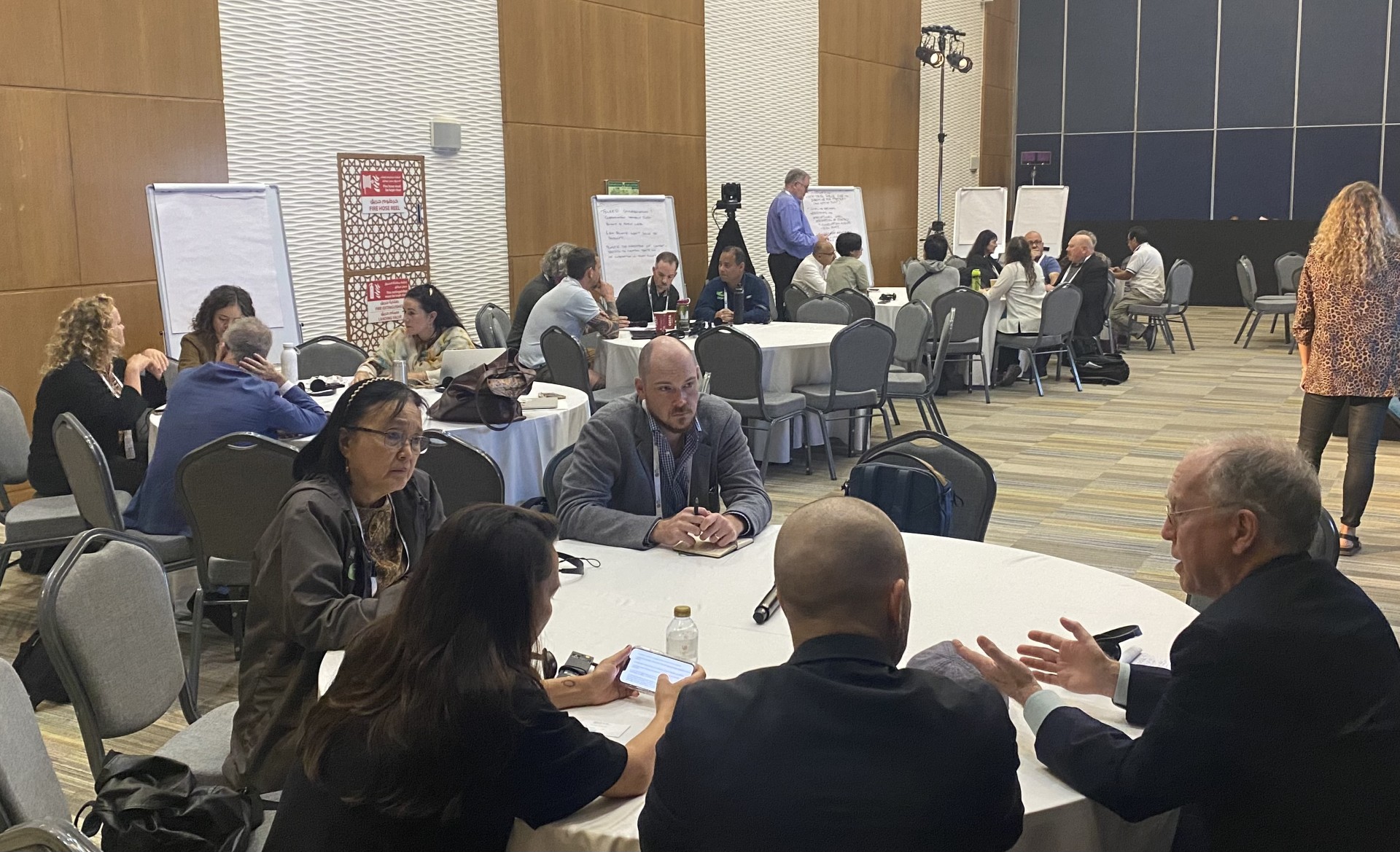
The Nature Crime Alliance gathered environmental crime practitioners to explore the implementation of the resolution into IUCN members’ activities.
Building momentum towards the UN Crime Congress
Such fora includes the UN Crime Congress, set to convene in Abu Dhabi in April 2026, where there is an opportunity to build on the IUCN resolution and keep environmental crime high on the agenda. A session convened by the Government of France in partnership with the Government of Peru, UNODC, the Wildlife Justice Commission, ICEL, WCS, WRI, NWC, the Alliance of NGOs on Crime Prevention and Criminal Justice, and the Global Initiative to End Wildlife Crime, highlighted how momentum is building in the fight against environmental crime across several UN frameworks, with the prospect of a ‘fourth protocol’ in the UN Convention against Transnational Organized Crime (UNTOC) the focus of much discussion.
A session on the role of law enforcement in fighting environmental, crime convened by the Interior Ministry of the UAE and featuring insights from the Ministry’s Foreign Affairs Bureau, the Federal Police of Brazil, the Gendarmerie Nationale (France), UNODC, and ESRI, also looked ahead to the UN Crime Congress as an opportunity to build international progress on this issue.
Environmental crime on the agenda
Members of the Alliance were also active at the Congress. IFAW convened a session on wildlife crime in Latin America which featured insights from TRAFFIC and WCS, while Earth League International hosted a podcast recording on environmental crime convergence that also featured IFAW.
Elsewhere, the World Bank’s Global Wildlife Program held a session on the role of behavioral change in driving positive conservation outcomes, including in the context of wildlife crime, and the Cheetah Conservation Fund also held a press call on new approaches to tackling wildlife crime in the Horn of Africa.
The efforts of these stakeholders is reflected in the Abu Dhabi Call to Action, issued at the end of the Congress, which includes reference to Crimes that Affect the Environment. We’re grateful to the efforts of our members, partners and other stakeholders who participated in the Congress to elevate environmental crime on the conservation agenda.
For more information, contact Luke Foddy, Communications Manager: luke.foddy@wri.org
